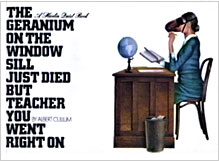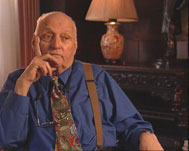TITLE: The Geranium on the Window Sill Just Died...
AUTHOR: Eugene Wallingford
DATE: January 18, 2005 5:40 AM
DESC: What children experience in a classroom should bear some connection to life. It should help them to grow from where they are.
-----
BODY:
On his dinner conversation mailing list,
Rich Pattis
recently recommended the PBS movie
A Touch of Greatness,
about the teacher Albert Cullum. After attempting a
career as a stage actor, Cullum began teaching in an
elementary school in the late 1940s. He used poetry
and drama as integral parts of his classroom, where
children were encouraged to learn through productive
work, not by listening to him. He believed that
children have a natural affinity for great ideas and
so introduced them to classic literature and real
science immediately.
 I missed the PBS showing of the film and may not get
around to seeing it any time soon, so I grabbed a couple
of his books from the library. The book that explains
his teaching approach best looks to be
Push Back the Desks.
I just started it last night. Over the weekend, though,
I read his children's-book-for-adults,
The Geranium on the Window Sill Just Died
But teacher Went Right On.
I call it that because it is written just like a book
for kindergarteners (one page of picture for each partial
page of text, written with short sentences in a young
student's voice) but is clearly aimed at adults. Indeed,
the book is "dedicated to all those grownups who, as
children, died in the arms of compulsory education".
I missed the PBS showing of the film and may not get
around to seeing it any time soon, so I grabbed a couple
of his books from the library. The book that explains
his teaching approach best looks to be
Push Back the Desks.
I just started it last night. Over the weekend, though,
I read his children's-book-for-adults,
The Geranium on the Window Sill Just Died
But teacher Went Right On.
I call it that because it is written just like a book
for kindergarteners (one page of picture for each partial
page of text, written with short sentences in a young
student's voice) but is clearly aimed at adults. Indeed,
the book is "dedicated to all those grownups who, as
children, died in the arms of compulsory education".
 Cullum clearly thinks that education is something quite
different from what usually goes on in our schoolrooms.
(Does that
sound familiar?)
He has a point. Though I've certainly thought a lot
about the shortcomings of compulsory education -- especially
since my daughters reached school age, I'd never thought
about all the little ways in which school can dehumanize
and demotivate the wonderful little minds that our children
have.
Two passages from the book really struck a chord with me.
In the first, a small child asks the teacher if she likes
his picture of a cherry tree. The students has colored
the cherries red and the leaves green, going against the
instructions. "But, teacher, don't you see my rainbow?
Don't you see all the colors? Don't you see me?"
The second comes from a student who has learned that
he is not good at anything in school:
Cullum clearly thinks that education is something quite
different from what usually goes on in our schoolrooms.
(Does that
sound familiar?)
He has a point. Though I've certainly thought a lot
about the shortcomings of compulsory education -- especially
since my daughters reached school age, I'd never thought
about all the little ways in which school can dehumanize
and demotivate the wonderful little minds that our children
have.
Two passages from the book really struck a chord with me.
In the first, a small child asks the teacher if she likes
his picture of a cherry tree. The students has colored
the cherries red and the leaves green, going against the
instructions. "But, teacher, don't you see my rainbow?
Don't you see all the colors? Don't you see me?"
The second comes from a student who has learned that
he is not good at anything in school:
I was good at everything
--honest, everything!--
until I started being here with you.
I was good at laughing,
playing dead,
being king!
Yeah, I was good at everything!
But now I'm only good at everything
on Saturdays and Sundays...
What a deep feeling of resignation this child must feel
to find that what matters to him doesn't matter, and that
he isn't good at what matters. This is what we tell
students when we place the focus on what they don't know
rather than on what more is out there. When we tell them
that their own identity is less important than our vision
of who they should be.
Don't get me wrong. I don't believe in the Noble Savage
theory about children, even children as learners. I don't
think that a child's self-esteem can be made the centerpiece
of all education. The child who colored the cherry tree
backwards needs to learn to follow instruction. To suggest
that this isn't an important skill to learn in school is
to undermine an essential role in learning and thinking.
And I don't believe that the second child was good at
everything before he came to school. He may not
have been good at much. But he felt like he controlled
his enjoyment of the universe, at least in ways that
mattered to him. He needs to learn that there is more
to life than just laughing, playing dead, and being king.
There are even times and places when those things aren't
very important.
But he doesn't need to learn that those
things don't matter. And he doesn't need to learn that
individuality isn't important. He simply needs to learn
that the world is even bigger than his wonderful little
mind knows just yet, and that he can do more and better
things in this big world. Education is about expanding
the child's mind, not limiting it. It should build on
who the child is, not who the teacher is. It should
increase the wonder, not extinguish it.
Being this sort of teacher requires that most of us
unlearn a lot of habits learned by example. Fortunately,
most of us have had at least one teacher who inspired
us in the ways Cullum suggests. I can think of many
such teachers throughout my many years of education
(Mrs. Brand, Mrs. Bell, Mr. Zemelko, Mr. Rickett, Mr.
Smith, Dr. McGrath, and Dr. Stockman, to name a few).
Even still, other habits formed -- and die hard, if at
all, and only then after persevering. This is one of
those situations in which I have some idea of what the
right thing to do is, even if I don't do it very well
yet.
-----
 I missed the PBS showing of the film and may not get
around to seeing it any time soon, so I grabbed a couple
of his books from the library. The book that explains
his teaching approach best looks to be
Push Back the Desks.
I just started it last night. Over the weekend, though,
I read his children's-book-for-adults,
The Geranium on the Window Sill Just Died
But teacher Went Right On.
I call it that because it is written just like a book
for kindergarteners (one page of picture for each partial
page of text, written with short sentences in a young
student's voice) but is clearly aimed at adults. Indeed,
the book is "dedicated to all those grownups who, as
children, died in the arms of compulsory education".
I missed the PBS showing of the film and may not get
around to seeing it any time soon, so I grabbed a couple
of his books from the library. The book that explains
his teaching approach best looks to be
Push Back the Desks.
I just started it last night. Over the weekend, though,
I read his children's-book-for-adults,
The Geranium on the Window Sill Just Died
But teacher Went Right On.
I call it that because it is written just like a book
for kindergarteners (one page of picture for each partial
page of text, written with short sentences in a young
student's voice) but is clearly aimed at adults. Indeed,
the book is "dedicated to all those grownups who, as
children, died in the arms of compulsory education".
 Cullum clearly thinks that education is something quite
different from what usually goes on in our schoolrooms.
(Does that
sound familiar?)
He has a point. Though I've certainly thought a lot
about the shortcomings of compulsory education -- especially
since my daughters reached school age, I'd never thought
about all the little ways in which school can dehumanize
and demotivate the wonderful little minds that our children
have.
Two passages from the book really struck a chord with me.
In the first, a small child asks the teacher if she likes
his picture of a cherry tree. The students has colored
the cherries red and the leaves green, going against the
instructions. "But, teacher, don't you see my rainbow?
Don't you see all the colors? Don't you see me?"
The second comes from a student who has learned that
he is not good at anything in school:
Cullum clearly thinks that education is something quite
different from what usually goes on in our schoolrooms.
(Does that
sound familiar?)
He has a point. Though I've certainly thought a lot
about the shortcomings of compulsory education -- especially
since my daughters reached school age, I'd never thought
about all the little ways in which school can dehumanize
and demotivate the wonderful little minds that our children
have.
Two passages from the book really struck a chord with me.
In the first, a small child asks the teacher if she likes
his picture of a cherry tree. The students has colored
the cherries red and the leaves green, going against the
instructions. "But, teacher, don't you see my rainbow?
Don't you see all the colors? Don't you see me?"
The second comes from a student who has learned that
he is not good at anything in school: